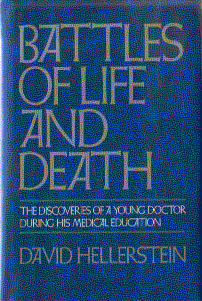
EXCERPTS:
Stone Babies
Battles of Life
and Death
Loving Touches
A Family of
Doctors
This site created by David
Hellerstein, MD
www.Hellerstein.net

BATTLES OF LIFE AND DEATH--Award-Winning Essays About the Education of a Young Doctor
BY DAVID HELLERSTEIN, MD
Published by Houghton Mifflin (hardcover), Warner Books (paperback)
AVAILABLE AT:
BACKINPRINT.COM --Autographed copies
AMAZON.COM --Discount price
The following excerpt, from the prize-winning essay "Touching," tells about the mysteries of the gynecology clinic
(c) DAVID HELLERSTEIN, MD
"SCOOT down to the edge of
the table, hon," says Dr. Snarr. The small room is hot, the air stuffy.
Our patient winces at the word hon. She is a young woman with chronic pelvic
pain, the bane of gynecologists, and I can tell she doesn't like Snarr's
tone. She does scoot along the table, though, and Snarr kicks the wheeled
stool toward me. I sit on it, slide between her legs, ready for my lesson
of the day. Feet and calves and thighs surround me, suddenly very close.
Snarr positions the lamp before my chest, so light pours on her. I warm the
speculum in my gloved hand and, with a twist, insert it.
"Open it up," he says. "Tighten it all the way open.
Pull down to keep away from the urethra. You hit the urethra and no patient
will ever come back to you."
Snarr is my teacher, a gaunt and narrow-shouldered man
with a small potbelly below the belt of his corduroy pants. Before coming
in here, he went over the information I had gathered and insisted it was
nonsense. She couldn't possibly feel that kind of pain. I must not be asking
the right questions. Hadn't I learned anything? Gynecologists traditionally
have
the reputation of being the dummies of medicine: surgeons laugh at their
clumsiness in the operating room, internists at their ignorance of medical
fact, psychiatrists at their insensitivity.
And so far Snarr had done nothing to dispel that prejudice,
which was too bad, considering that I was an impressionable third-year medical
student, still trying to decide what field to select.
"Okay," says Snarr. "Now swab it out real well. Get some
cells on that."
I swab.
"Pull that speculum out now. Get a good look at those
walls."
I see pink folds as I pull, pink, moist walls bulging
against the metal of the speculum - aquatic territory, the scalloped forms
of submarine life. It's out. Snarr is quick next with lu bricating jelly
on the first two fingers of my glove. I stand up, push the stool away. I
begin the manual exam.
"Aiee!" The woman screams and slides up on the table.
"God! Oh God!"
"So that's . . . that's where it hurts," I say. I'm sweating.
"Just. . . just a second, I'll try more gently."
I feel around again. This time she doesn't scream. She
breathes deeply. I can't feel a damn thing, but with Snarr watching I can't
pull out right away. For a month I've been spending afternoons in the gynecology
clinic with Dr. Snarr -a month of women's bottoms on the edges of tables,
of the hot lamp in front of my chest, the examining glove on my hand, powdered
inside, the smells of femaleness. And the confidences of women, fascinating
and at times overpowering, about their pains, their periods, their fertility,
their husbands, their lovers. What gets to me, though, are the exams. The
touching. Deep internal touching, feeling for the bulge of the uterus, for
those small elusive olives the ovaries, exploring for tenderness, creating
sudden moments of pain. Technically I'm reasonably good, as good as can be
expected for a third-year medical student rotating through Ob-Gyn. But I
still find it strange to be touching intimately but without passion--as a
doctor.
#
#
#
#
#
"All right," Dr. Snarr says, "let me try my hand." He steps in. I strip off
my glove and wash my hands, ready to observe a deft exam, pinpointing the
source of pain, exploring yet reassuring.
But in a second the woman is screaming, writhing on the
table. Snarr is reaching way far in, clumsily it seems, pushing so hard her
hips rise from the table; and she is crying, grabbing the table with her
hands. I feel sick just watching. I have no way of knowing what, if anything,
Snarr is finding, since he does not explain.
"All right, hon," he tells her. He pulls off his glove.
"Wipe yourself off; we'll come back and see you in a minute.
"I don't know why the heck she hurts," he says when we
are outside. "Give her some estrogen cream."
She'd dressed when I come back in. She's pale and woozy,
and there's still pain in her eyes. I hand her the prescription.
"Come back if it gets worse," I say.
"Than what?" the woman asks.
I am embarrassed. I murmur something, that I'm sorry
we didn't come up with anything. Then I hurry out after my teacher.
I find him in the side room, having coffee and doughnuts,
courtesy of the pharmaceutical rep. The next patient isn't ready yet.
"Have some," he says.
I decline. I'm too jittery to eat.
"That girl," says Dr. Snarr. "What do you think her problem
is?"
#
#
#
#
#
INTERESTED IN ORDERING BATTLES OF LIFE AND DEATH??
Hardcover:
Amazon.com
Backingprint.com--autographed
copies
Paperback:
Amazon.com
Backinprint.com
More information at David Hellerstein,
MD Homepage
Here, in an excerpt from the essay "The Battle for the Dead," a young doctor struggles with a patient's family to get permission for an autopsy (the Post, or postmortem exam)...to find out why his patient died....
(c) DAVID HELLERSTEIN, MD
"NOW comes the real question," said our chief resident. "How do you get the post?"
It was noontime in July, a few days after internship had started, and we, the new interns, had been called down to the Medicine Library for lunch. Through the chief's introductory remarks about the importance of the autopsy in the progress of medical science, we ate sandwiches and drank Cokes and dozed and looked out dusty windows at the inaccessible sky. The chief introduced his buddy Jerry, one of the other residents. He was stocky, with a mustache, in rumpled whites. Now we woke. What we needed was not history but this, nuts and bolts. After all, we were the ones who, at 3:00 a.m., had to ask for a signature on a consent-to-autopsy form, and we were the ones blamed for failure on rounds the next morning. You didn't get the post on Mrs. Jacobs? We wanted it, you know.
"Number one," said Jerry, "when you ask the family for the post, don't reason with them. It's a waste of time. If you talk about the progress of science they'll walk out the door. Instead, listen to what they're saying. Whatever it is, agree one hundred percent. They always say one thing: 'He's suffered enough.' If you're rational, you'll say, 'What, are you crazy? He's dead. How the hell's an autopsy going to make him suffer anymore?' And they'll walk out the door. Instead, say, 'He did suffer enough. You're right. And I'll make sure he won't suffer anymore.'"
One of us interns had a question. "Just how do you keep the dead guy from suffering? Don't they ask that?"
# # # #
On rounds the next morning, another resident asked what had happened. I explained how none of Jerry's techniques had made any difference. He shook his head; it was one of the minor disappointments of the day.
"Too bad. We wanted it, you know." Then he grinned. "Did you try the gold ball story?"
"What's that?"
"You tell the family that just before the patient died you had him swallow a gold ball and now it's stuck inside. The gold ball is worth five thousand dollars, and if you don't do the autopsy it's added to the hospital bill."
"That's sick," I said. "Who would say that?"
"Well, did you get the post?"
"No, the damn coroner gave in."
"They always do," he said. "They won't fight the family. It's up to you to get it."
"I know," I said. "Next time I will."
# # # #
INTERESTED IN ORDERING BATTLES OF LIFE AND DEATH??
Hardcover:
Amazon.com
Backingprint.com--autographed
copies
Paperback:
Amazon.com
Backinprint.com
More information at David Hellerstein,
MD Homepage
![[IMAGE]](bolad-hc.gif)
Home | Premed Portal | Becomingadoctor Bookstore | Excerpts | Contact us
